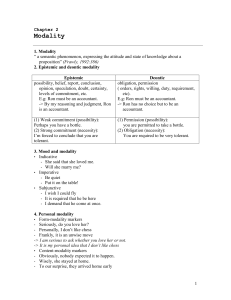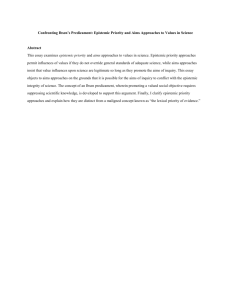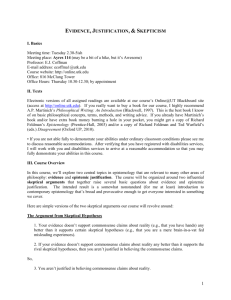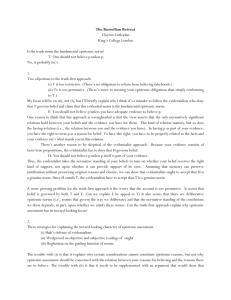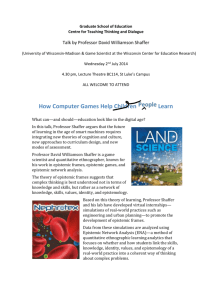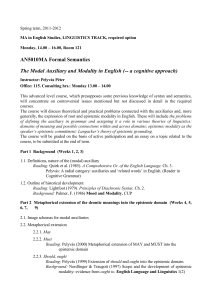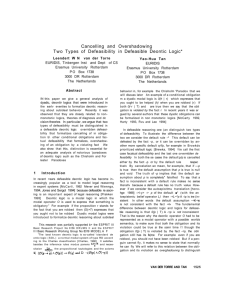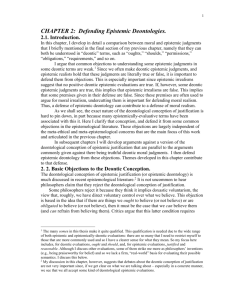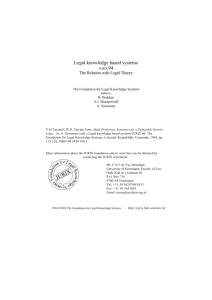EB-F10-d2
advertisement
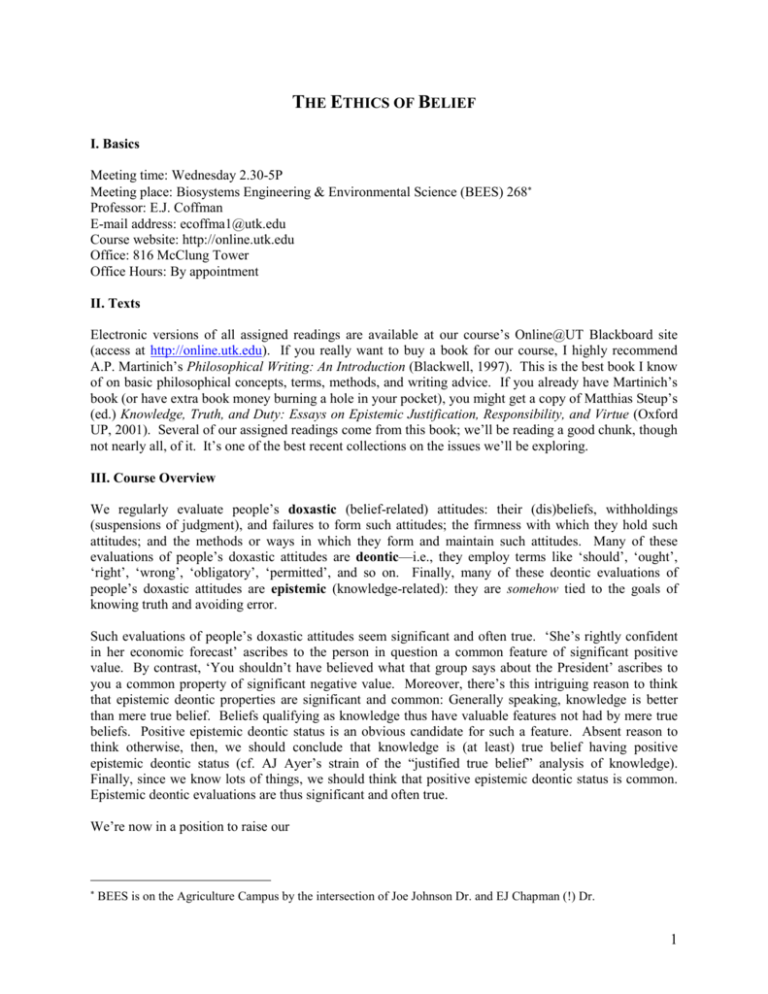
THE ETHICS OF BELIEF I. Basics Meeting time: Wednesday 2.30-5P Meeting place: Biosystems Engineering & Environmental Science (BEES) 268 Professor: E.J. Coffman E-mail address: ecoffma1@utk.edu Course website: http://online.utk.edu Office: 816 McClung Tower Office Hours: By appointment II. Texts Electronic versions of all assigned readings are available at our course’s Online@UT Blackboard site (access at http://online.utk.edu). If you really want to buy a book for our course, I highly recommend A.P. Martinich’s Philosophical Writing: An Introduction (Blackwell, 1997). This is the best book I know of on basic philosophical concepts, terms, methods, and writing advice. If you already have Martinich’s book (or have extra book money burning a hole in your pocket), you might get a copy of Matthias Steup’s (ed.) Knowledge, Truth, and Duty: Essays on Epistemic Justification, Responsibility, and Virtue (Oxford UP, 2001). Several of our assigned readings come from this book; we’ll be reading a good chunk, though not nearly all, of it. It’s one of the best recent collections on the issues we’ll be exploring. III. Course Overview We regularly evaluate people’s doxastic (belief-related) attitudes: their (dis)beliefs, withholdings (suspensions of judgment), and failures to form such attitudes; the firmness with which they hold such attitudes; and the methods or ways in which they form and maintain such attitudes. Many of these evaluations of people’s doxastic attitudes are deontic—i.e., they employ terms like ‘should’, ‘ought’, ‘right’, ‘wrong’, ‘obligatory’, ‘permitted’, and so on. Finally, many of these deontic evaluations of people’s doxastic attitudes are epistemic (knowledge-related): they are somehow tied to the goals of knowing truth and avoiding error. Such evaluations of people’s doxastic attitudes seem significant and often true. ‘She’s rightly confident in her economic forecast’ ascribes to the person in question a common feature of significant positive value. By contrast, ‘You shouldn’t have believed what that group says about the President’ ascribes to you a common property of significant negative value. Moreover, there’s this intriguing reason to think that epistemic deontic properties are significant and common: Generally speaking, knowledge is better than mere true belief. Beliefs qualifying as knowledge thus have valuable features not had by mere true beliefs. Positive epistemic deontic status is an obvious candidate for such a feature. Absent reason to think otherwise, then, we should conclude that knowledge is (at least) true belief having positive epistemic deontic status (cf. AJ Ayer’s strain of the “justified true belief” analysis of knowledge). Finally, since we know lots of things, we should think that positive epistemic deontic status is common. Epistemic deontic evaluations are thus significant and often true. We’re now in a position to raise our BEES is on the Agriculture Campus by the intersection of Joe Johnson Dr. and EJ Chapman (!) Dr. 1 Central Question: Can the view that epistemic deontic properties are significant and common be developed so as to withstand critical scrutiny? We’ll approach this relatively big question through three sets of interrelated smaller questions: Control Questions: Does epistemic deontic status require some kind of control? If so, what kind? And do we (often enough) have the required control relative to our doxastic attitudes? If not, then what accounts for this difference between epistemic deontic status and other kinds of deontic status—e.g., moral—that require some kind of control? Essence Questions: What is the nature or essence of epistemic deontic status? Is there a single basic epistemic duty? Or are there multiple basic such duties? Relation Questions: How does positive epistemic deontic status relate to warrant—i.e., the property that makes the difference between mere true belief and knowledge? How does epistemic deontic status relate to other kinds of deontic status—specifically, moral and prudential? And how do the various kinds of deontic properties (epistemic, moral, prudential, …) relate to the notion of doxastic rationality (the concept rational belief)? Carefully extracting and evaluating key arguments defended in relevant important recent work will help us develop our own well-reasoned positions on such questions. (For additional introductory discussion of the kinds of issues we’ll be exploring, see pertinent entries in the Stanford Encyclopedia of Philosophy [e.g., “The Ethics of Belief”] and Internet Encyclopedia of Philosophy [e.g., “Doxastic Voluntarism”].) This course is the Proseminar for new graduate students (it counts as an ELMS seminar for old graduate students). The Proseminar’s main purpose is to focus us more intently on—and help us continue cultivating and strengthening—certain “research-oriented” habits and skills required to thrive in graduate school and beyond as a professional. These are habits and skills that enable you to make a significant contribution to research on your favorite philosophical issues (e.g., MA thesis/PhD dissertation, conference presentation, published article, etc.). Central among these habits and skills are: • finding recent, high-quality work (journal articles, books, reviews, …) on your favorite philosophical topics, questions, and issues. • properly understanding—or: trying hard and realizing that you still don’t understand—the central philosophical “moves” in whatever you’re currently studying (assigned by others or yourself). • coming up with—and then developing in detail—“debate-advancing” objections, arguments, theories, accounts, analyses, defenses, etc. • sharing and discussing your ideas with peers and professors. • identifying additional relevant published work to ensure your research is suitably informed and thorough. • drafting well-organized, well-written conference- (≈ 3000 words) and journal- (≈ 5000 words) length papers that meet the following basic criteria for good philosophical essays: ◦ is informed by, and interacts with, some prominent recent (≈ last 15-20 years) works. ◦ presents plausible arguments for nontrivial conclusions. 2 ◦ defends arguments from likely questions, objections, worries, etc. ▫ has been revised in light of feedback from peers and professors. While these habits and skills are “research-oriented,” cultivating them naturally improves one’s teaching too. IV. Course Requirements ▪ A main goal for everyone: A paper worthy of presentation at a well-established professional philosophy conference. A. Proseminar requirements ▪ Weekly Mini-Commentaries (MCs) on assigned readings ▫ Each week, you’ll write a 1-2 page critical essay (500-750 words) on an assigned reading. You’ll aim to do two things in these essays: (i) contextualize and reconstruct one of the reading’s key philosophical moves (e.g., an argument, objection, defense, account, etc.) and (ii) raise a significant objection to or question about that move. In doing these things, you’ll use our discipline’s standard technical terminology for explaining and assessing argumentation (for a refresher, see the papers by Frances, Pryor, and Coffman in the ‘Philosophy Fundamentals: Concepts, Methods, & Writing’ folder at our Bb site [subfolder: ‘Basic Concepts, Terms, & Methods’]). ▫ You’ll submit a given MC to me electronically—via either e-mail or Blackboard—on Tuesday morning (i.e., before noon) prior to our Wednesday afternoon class. Each of your MCs will earn a grade of Exemplary, Satisfactory, or Unsatisfactory. An Exemplary MC will contextualize and reconstruct a central part of an assigned reading, then raise a significant objection to or question about that part of the reading. All MCs must include a word count. ▫ MCs will help form the basis of class discussion. I reserve the right to ask authors of MCs deemed Exemplary to present their MCs informally to the class. We’ll devote most of our time in class to group discussion of assigned readings. Our aim in discussing a given paper will be to lay the groundwork for what would be a good “conference commentary” on that paper: a reply of 750-1000 words that raises a handful of critical points meant to help the author improve the paper. ▪ One “formal” MC presentation (any way you like: read it, talk us through it, use PowerPoint, …) ▪ Philosopher’s Index research assignment ▫ Using Philosopher’s Index (accessible through the Library’s Philosophy subject guide: http://www.lib.utk.edu/refs/phil/), you’ll find two recent (≈ last 15 years) articles that you think might figure in your term paper for the course. You’ll then read, and write an MC on, each article (due: 5P Friday October 29th). ▪ Term paper (2500-3000 words) ▫ You’ll write this course’s term paper (which can build on some of your MCs) in five steps: • Prospectus: Before starting serious work on a full draft of your term paper, you’ll construct a prospectus that you’ll submit to me for comments (due: 5P Friday November 5th). 3 ◦ prospectus = a rough summary (in paragraph or outline form) of the following key elements of your paper: (i) the main conclusion(s) you’ll be arguing for; (ii) brief sketches of the arguments you’ll give for your main conclusion(s); and (iii) brief sketches of some questions about, or objections to, your argument you’ll consider. • 1st full draft: You’ll then work up a full draft of your paper in light of my feedback on your prospectus. • Colleague comments: Next, I’ll pair you with one of your colleagues, who will provide you with written comments on a full draft of your paper. • 2nd full draft: After revising your paper in light of your colleague’s comments, you’ll submit your paper to me for additional comments (due: 5P Wednesday December 1st). • 3rd (and final!) draft: Finally, you’ll submit a draft of your paper revised in light of my comments (due: 12P Monday December 13th). ▪ Small but important pro-research activities ▫ Sign up for electronic updates from some journals relevant to your main philosophical interests. ▫ Identify three non-APA professional or graduate student conferences to which you could submit a polished version of your term paper. B. ELMS seminar requirements ▪ Three Critical Commentaries (first two before Fall Break, third before Thanksgiving) Each of your CCs (1000-1500 words) will earn a grade of Exemplary, Satisfactory, or Unsatisfactory. An Exemplary CC will raise—and maybe attempt to answer—a handful of significant objections to and/or questions about central parts of some or other required or recommended reading(s). All CCs must be typed and include a word count; submit them electronically via either e-mail or Blackboard. ▪ Term Paper (3000-4000 words) You’ll submit a prospectus (see above) to me for comments by 5P Friday November 12th. The final draft of your term paper will be due by 5P Monday December 6th. Your term paper can derive from one of your CCs. ▪ Small but important pro-research activities (see above) V. Important Dates 8/18 (W): First class meeting 10/7-10/8 (R-F): Fall Break; first two CCs due (ELMS) 10/29 (F): PI research assignment due (Proseminar) 11/5 (F): Term paper prospectus due (Proseminar) 11/12 (F): Term paper prospectus due (ELMS) 11/25-11/26 (R-F): Thanksgiving Break; third CC due (ELMS) 12/1 (W): First full draft of term paper due (Proseminar—revised in light of colleague’s comments) 12/6 (M): Full draft of term paper due (ELMS) 12/13 (M): Second full draft of term paper due (Proseminar—revised in light of EJ’s comments) 4 VI. List of Required Readings ▪ All assigned readings will be available at Bb. I’ll make official reading assignments in class, over email, and at Bb. John Locke, “Of Enthusiasm” AJ Ayer, “Knowing as Having the Right to be Sure” WK Clifford, “The Ethics of Belief” William James, “The Will to Believe” Linda Zagzebski, “Epistemic Value and What We Care About” Edmund Gettier, “Is Justified True Belief Knowledge?” Michael DePaul, “Value Monism in Epistemology” Hilary Kornblith, “Justified Belief and Epistemically Responsible Action” Earl Conee and Richard Feldman, “Evidentialism” Earl Conee and Richard Feldman, “Evidence” [yes, this is different from the one just above…] William Alston, “The Deontological Conception of Epistemic Justification” John Heil, “Believing Reasonably” Eugene Mills, “The Unity of Justification” Matthias Steup, “Doxastic Voluntarism and Epistemic Deontology” Susan Haack, “The Ethics of Belief Reconsidered” Carl Ginet, “Deciding to Believe” Richard Feldman, “The Ethics of Belief” Keith DeRose, “Ought We to Follow Our Evidence?” John Greco, “Virtues and Rules in Epistemology” Linda Zagzebski, “From Reliabilism to Virtue Epistemology” Robert Audi, “Doxastic Voluntarism and the Ethics of Belief” Thomas Kelly, “The Rationality of Belief and Some Other Propositional Attitudes” Jeremy Fantl and Matthew McGrath, “Evidence, Pragmatics, and Justification” Thomas Kelly, “Epistemic Rationality as Instrumental Rationality: A Critique” Stephen Grimm, “Epistemic Normativity” Peter van Inwagen, “It is Wrong…” Peter van Inwagen, “Listening to Clifford’s Ghost” Thomas Kelly, “The Epistemic Significance of Disagreement” Roger White, “Epistemic Permissivism” Jonathan Sutton, “Stick to What You Know” 5

